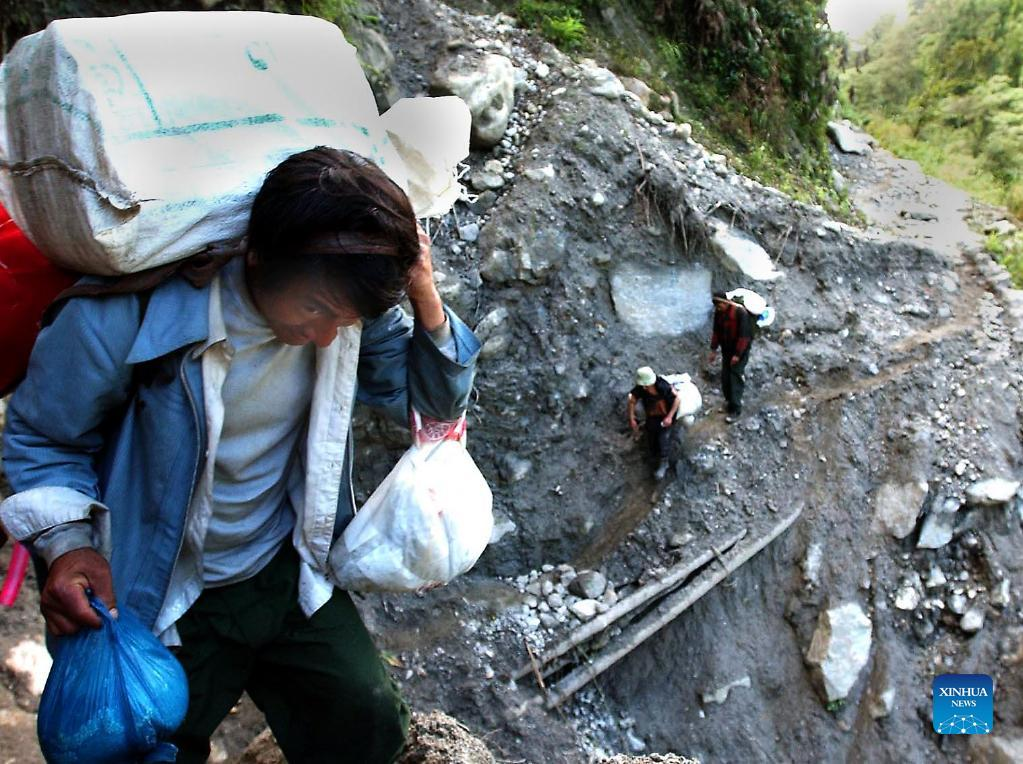
Changgar shows newly-picked tea leaves to his granddaughter in Medog County, southwest China's Tibet Autonomous Region, June 10, 2022. (Xinhua/Liu Ying)
by Xinhua writers Lin Jianyang, Lyu Qiuping and Liu Ying
LHASA, Oct. 2 (Xinhua) -- On a narrow rocky trail where even horses were reluctant to move, a porter, carrying a washing machine on his shoulder, climbed step by step over a peak at more than 4,600 meters above sea level, heading home deep in the Himalayas.
It was a scene captured by a documentary produced by the Japanese public broadcaster NHK in 2010.
The porter in the film represented most young men in Medog, China's last roadless county in the country's Tibet Autonomous Region, who had to trek for days to carry heavy loads in and out of the mountain-locked county.
After the isolation of the county ended in October 2013, when Medog Highway opened to traffic, porters in Medog faded into history.
Medog was lifted out of poverty by the end of 2019. The per capita disposable income of farmers and herders skyrocketed to 15,278 yuan (about 2,147 U.S. dollars) in 2021 from 4,875 yuan in 2012.
ISOLATION
Located in a deep valley in the Himalayas, Medog is besieged by high hills and primitive forests. For centuries, porters were the major transportation means for the county.
It took porters up to five days to arrive at Pai Township, the nearest town outside the mountains, as they had to climb snow-capped mountains without any concrete road.
Being the oldest son in a family that could not afford school, Tenzin Gyatso, an ethnic Monba from a village in the county, started being a porter at age 12.
When he first arrived at Pai Township, he saw wide roads, vehicles and television sets for the first time, forming a sharp contrast to his hometown.
"We had nothing back home, even no electricity," Tenzin Gyatso recalled.
In his life as a porter, he carried cement, steel and other materials for construction sites and daily necessities for a public-owned store. He also used to carry sausages, cigarettes and herbicides back home for retail.
"The sausage bought at the price of 14 yuan per kg could be sold at 50 yuan per kg," he said.
Using the savings he acquired by being a porter and selling groceries, Tenzin Gyatso successively bought a hydroelectric generator, a radio cassette recorder, a television set and a washing machine, carrying them home all by himself. The generator did not retire until a nearby hydropower station started operation.
In the isolated county, children had to trek for days to school, and many patients had to be carried on a stretcher or shoulder to a hospital in the city proper.
Changgar, a former porter from Medog's Baibung Township, still remembered when he and his fellow villagers took turns carrying an 85-kg patient to a hospital.
"We shifted every half an hour. On one leg of the journey, I carried the patient on my shoulders for two hours," said Changgar, now 59, who weighed only 60 kg at that time.
Jamyang, vice president of the hospital of Medog, said because of the poor transportation facilities, the hospital was short of large equipment and professionals, and therefore, patients in serious condition had to be transferred to larger hospitals outside the county.
"Some patients died on the way while being carried out," recalled Jamyang, who has been working at the hospital since 2008.
Because of long trips carrying heavy loads, many male residents in Medog suffer from spinal and knee joint problems even now, according to Jamyang.
ROAD TO PROSPERITY
The situation significantly changed following the start of operation of the Medog Highway in October 2013, with vehicles and machines flowing in. Children can now go to school by vehicle, and, whenever needed, patients can be transferred to the city hospital quickly, sometimes by ambulance. Porters are no longer needed.
Wei Changqi, Party chief of the county, said Medog Highway has facilitated the travel of local people, greatly guaranteed the supplies needed for people's livelihood and the county's construction, and helped bring down prices of goods in the county. Healthcare and education levels have also been much improved.
Tenzin Gyatso now owns an excavator, which he leases to construction sites. He also runs a homestay and rents it to construction workers. Combined with the income from the tea plantation, his family now earns more than 100,000 yuan a year.
Benefiting from the improved education situation, Tenzin Gyatso's four children have all studied at universities. "Young men are lucky as they no longer have to be porters as we were," he said.
After graduation, Tenzin Tsomo, Tenzin Gyatso's eldest daughter, teaches in a high school in the city of Qamdo, more than 1,000 km away from Medog.
To return home, the 30-year-old needs to hire a car to head for Bomi County, where she has to transfer to a bus. The entire trip takes more than 16 hours.
To her delight, the Sichuan-Tibet Railway currently under construction will pass through both Qamdo and Bomi.
"When the railway line starts operation, it will be much more convenient to return home," said Tenzin Tsomo. ■

Tenzin Gyatso plays with his granddaughter in Medog County, southwest China's Tibet Autonomous Region, June 10, 2022. (Xinhua/Liu Ying)

File photo shows porters carrying goods through a landslide area to Medog County, southwest China's Tibet Autonomous Region, Oct. 18, 2004. (Xinhua)



